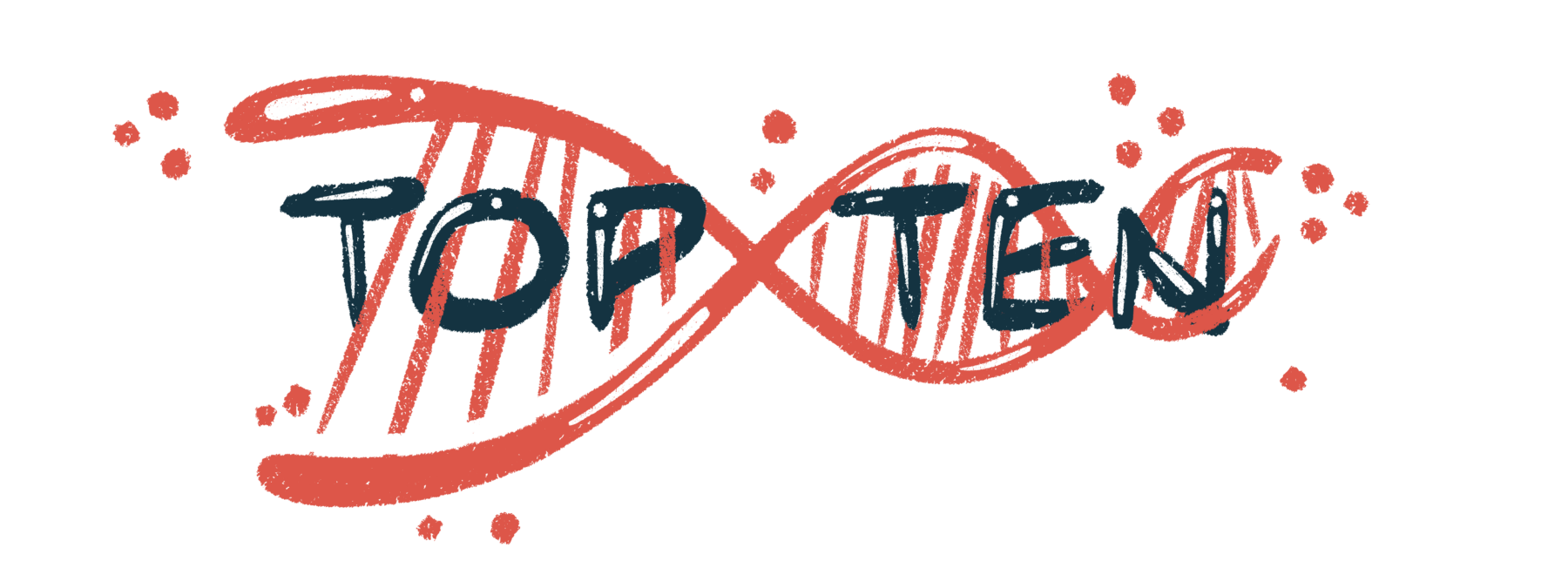Top 10 muscular dystrophy stories of 2023
Coverage ranged from expanded trial for Becker treatment to boy given Elevidys

Throughout 2023, Muscular Dystrophy News Today worked diligently to cover new scientific research, treatment developments, and clinical studies for muscular dystrophy (MD). Here are the 10 most-read stories of that year.
No. 10 – With EMBARK trial data, Sarepta seeks to expand Elevidys’ approval
Elevidys (delandistrogene moxeparvovec-roki) is a one-time gene therapy approved in the U.S. for certain patients with Duchenne muscular dystrophy (DMD). Its developer, Sarepta Therapeutics, plans to seek expanded approval of the treatment following top-line findings in the Phase 3 EMBARK (NCT05096221) clinical trial, expected to serve as a confirmatory study.
In June, the U.S. Food and Drug Administration gave accelerated approval to Elevidys for Duchenne patients, ages 4 to 5, who are able to walk. Such approval requires the therapy’s developer to conduct additional testing to confirm a clinical benefit. While EMBARK did not meet its primary endpoint — score changes on a standardized measure of motor function — it showed the therapy’s use, compared with a placebo, led to notable improvements across various measures of function, such as the time taken to walk 10 meters (about 33 feet) or to stand from a lying position.
No. 9 – Arrowhead asking to open Phase 1/2a trial of ARO-DUX4 in FSHD
Permission to open a Phase 1/2 clinical trial of ARO-DUX4, an RNA-based treatment candidate for facioscapulohumeral muscular dystrophy (FSHD), has been requested of regulators in New Zealand. In FSHD, the DUX4 gene, found in a region called D4Z4 near the end of chromosome 4, is abnormally switched on, producing a DUX4 protein that is harmful to muscles and results in muscle weakness.
ARO-DUX4 makes use of a strategy called RNA interference to control DUX4 activity, ultimately blocking its respective protein’s production. As such, the therapy is expected to help ease muscle damage and improved muscle function. If regulators agree to the trial, the therapy’s developer, Arrowhead Pharmaceuticals, plans to test escalating doses in adults with FSHD type 1 at one or more sites in New Zealand to determine the safest dose.
No. 8 – Enrollment opens in study of EDG-5506 in Becker
A Phase 2 clinical trial of EDG-5506 in people with Becker muscular dystrophy is expanding, enrolling 120 additional adults with the disease into a separate arm of the CANYON study (NCT05291091), being called GRAND CANYON. EDG-5506, an oral therapy, is designed to treat Becker muscular dystrophy (BMD) by impeding the activity of myosin, an essential protein used by muscles to contract. Through such blockage, the treatment seeks to render muscle contractions less forceful, helping to maintain their function over time.
A Phase 1 clinical study called ARCH (NCT05160415) showed stable or improved motor function after a year of treatment in most men with BMD, a marked departure from the disorder’s usual progression, its developer, Edgewise Therapeutics, reported.
No. 7 – FDA gives breakthrough status to DMD exon-skipping therapy
The U.S. Food and Drug Administration (FDA) designated NS-089/NCNP-02 a breakthrough therapy for DMD patients with mutations amenable to exon 44 skipping. The potential therapy works by skipping over, or omitting, whole exons — parts of a gene that code for proteins — as a way of circumventing mutations so that the remaining exons can fit together to make a shorter, working version of dystrophin.
The designation followed positive results in a Phase 1/2 study (NCT04129294) in Japan of NS-089/NCNP-02, being developed by NS Pharma, in boys with DMD. Two Phase 2 studies, including one cleared by the FDA and to take place in the U.S., and the other being conducted in Japan, are planned. The open-label and two-part U.S. study (NCT05996003) is listed but not yet recruiting an estimated 20 patients, ages 4 to 14.
No. 6 – Phase 3 study of losmapimod in FSHD patients fully enrolled
The Phase 3 REACH (NCT05397470) clinical trial assessing the efficacy and safety of losmapimod in treating in adults with FSHD is completely enrolled at sites in the U.S., Canada, and Europe, its developer, Fulcrum Therapeutics, announced in September. Top-line trial data covering patients treated with losmapimod, relative to those given a placebo, is expected late this year.
A small molecule, losmapimod works to selectively block p38 alpha and p38 beta, enzymes that help to regulate the activity of the DUX4 gene. Such suppression is expected to lessen the gene’s excessive activity to prevent further muscle damage.
No. 5 – First dose administered in AB-1003 Phase 1/2 study
A first person with limb-girdle muscular dystrophy type 2I/R9 has been dosed with the gene therapy AB-1003 in the Phase 1/2 clinical trial called LION-CS101 (NCT05230459), its developer, Asklepios BioPharmaceutical, reported. Enrolled adult patients, ages 18 to 65, will receive a single infusion of the therapy at one of two doses, or a placebo, and be monitored for safety for about a year. The trial may still be enrolling up to 10 eligible adults at sites in the U.S.
AB-1003, also known as LION-101, is a gene therapy candidate for limb-girdle muscular dystrophy type 2I/R9, which is caused by mutations in the gene FKRP. It is designed to deliver a healthy version of this gene to cells via a single infusion into the bloodstream.
No. 4 – Oral givinostat for DMD under FDA priority review
U.S. regulators have given priority review to an approval request for oral givinostat in treating Duchenne MD. Priority review cuts the FDA’s consideration period from 10 to six months and is reserved for treatments that could markedly improve care for serious conditions.
Givinostat, being developed by Italfarmaco, works to restrict the activity of histone deacetylases (HDACs), enzymes that modify how DNA folds in cells and impede the activity of certain genes, affecting the ability of muscle cells to regenerate. HDACs have been shown to be overactive in people with DMD, contributing to muscle deterioration.
No. 3 – Phase 1 trial findings support EDG-5506 in preserving muscles
Following a year of treatment with EDG-5506 in a Phase 1 trial, most men with Becker MD showed stable or improved motor function. These findings supported the expansion of the Phase 2 CANYON study, evaluating varying doses of EDG-5506 against a placebo in children and adults with Becker, to include about 120 adults patients in a new trial arm called GRAND CANYON.
Data from the ongoing and open-label Phase 1 ARCH clinical trial also supported the safety and tolerability of oral EDG-5506, and evidence of the therapy mitigating markers of muscle damage, Edgewise Therapeutics reported.
No. 2 – Phase 1b/2a clinical trial for BB-301 in OPMD approved
The U.S. Food and Drug Administration agreed to a Phase 1b/2a clinical study of BB-301, a gene therapy candidate for swallowing difficulties associated with oculopharyngeal muscular dystrophy (OPMD). Difficulty swallowing is a typical manifestation of OPMD, caused by mutations in the PABPN1 gene that result in the production of an abnormal protein of the same name that clumps within muscle cells and diminishes their function, leading to muscle weakness.
BB-301, being developed by Benitec Biopharma, uses an adeno-associated virus to transport DNA-directed RNA interference technology, which impedes mutant PABN1 protein production while supplying a healthy gene copy to produce a normal protein. The trial will test BB-301’s safety and efficiency, as well as changes in the function of the pharyngeal muscles of the throat.
No. 1. – Child with DMD treated with Elevidys at site where therapy began
A 5-year-old boy is among the first Duchenne MD patients to be treated with Elevidys soon after the gene therapy’s U.S. approval, Nationwide Children’s Hospital in Columbus, Ohio, announced. Gideon Griffiths, who was diagnosed with Duchenne at birth, received the infusion treatment at Nationwide, where it was first investigated, in August.
DMD is the longest gene in the human genome, instructing how to make the dystrophin protein. Its length complicated efforts to craft gene therapies for Duchenne, a progressive disorder characterized by muscle weakness and wasting. Elevidys delivers to muscle cells a gene encoding for a shorter but working form of dystrophin, the so-called Elevidys micro-dystrophin.
It’s the hope of everyone at Muscular Dystrophy News Today that these articles and our reporting throughout 2023 were of help to all those affected by MD. In 2024, we will continue to focus our efforts on keeping the community well informed of relevant discoveries and developments.






